
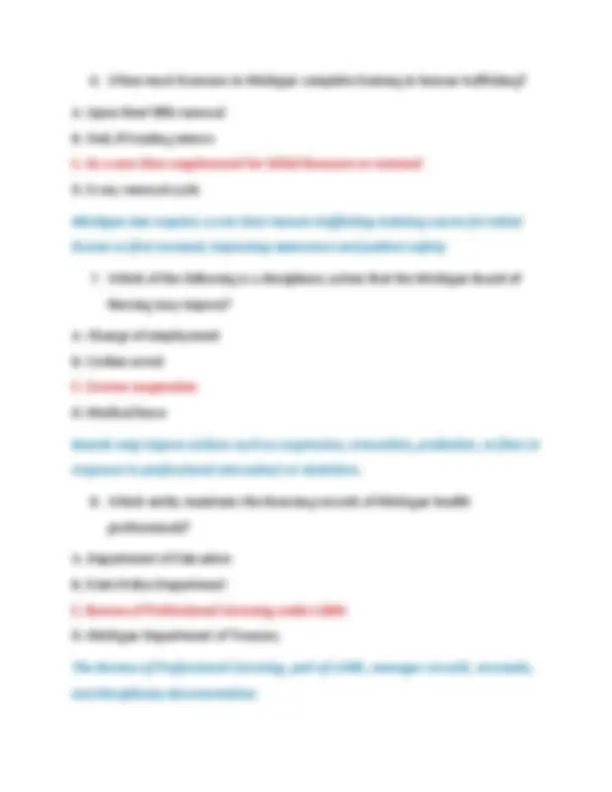
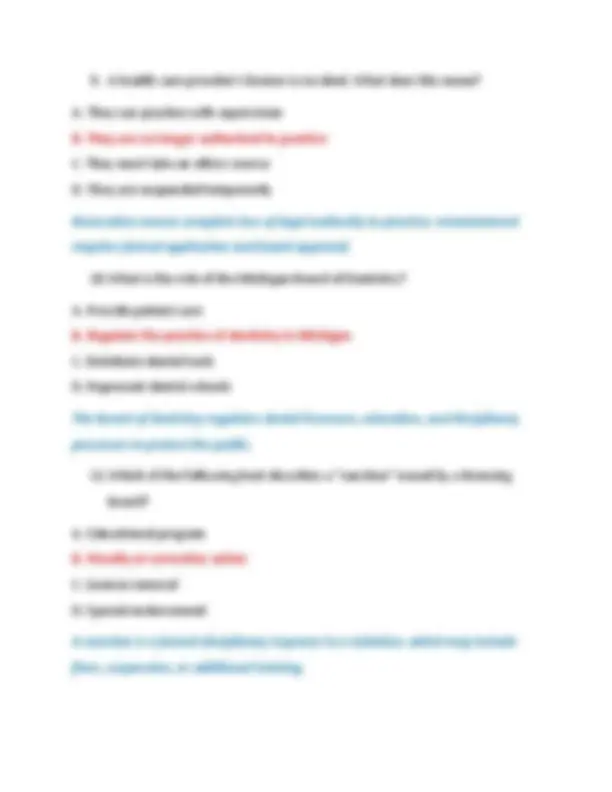
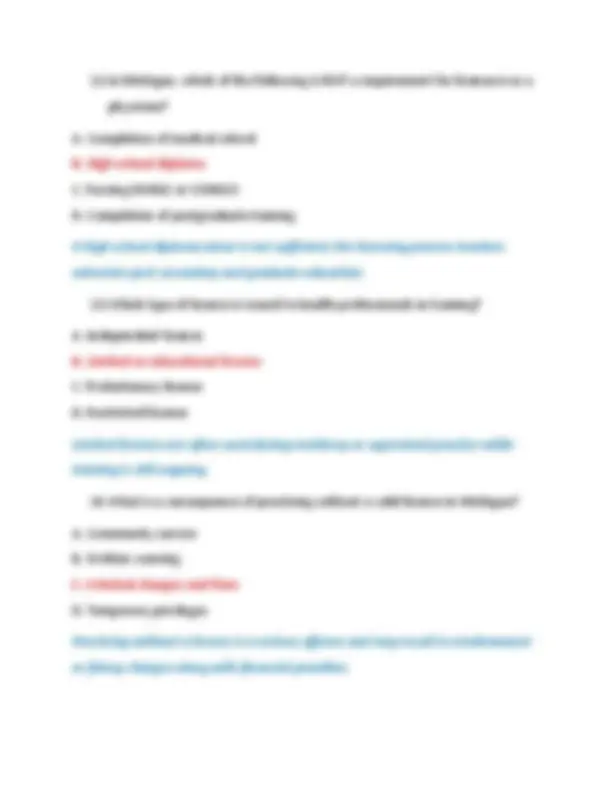
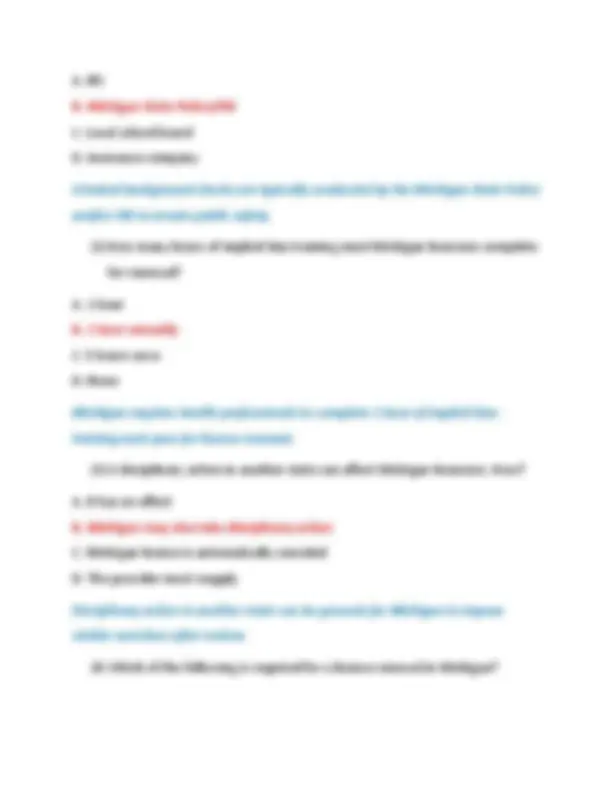
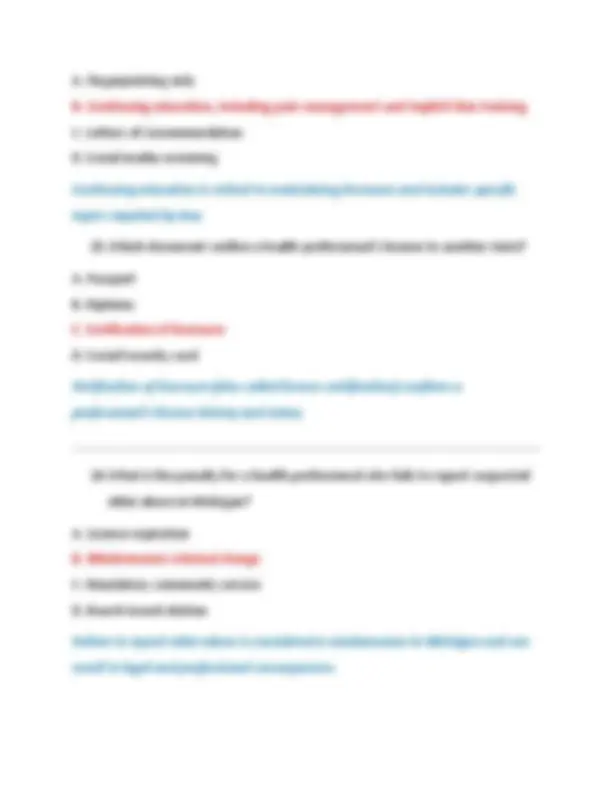
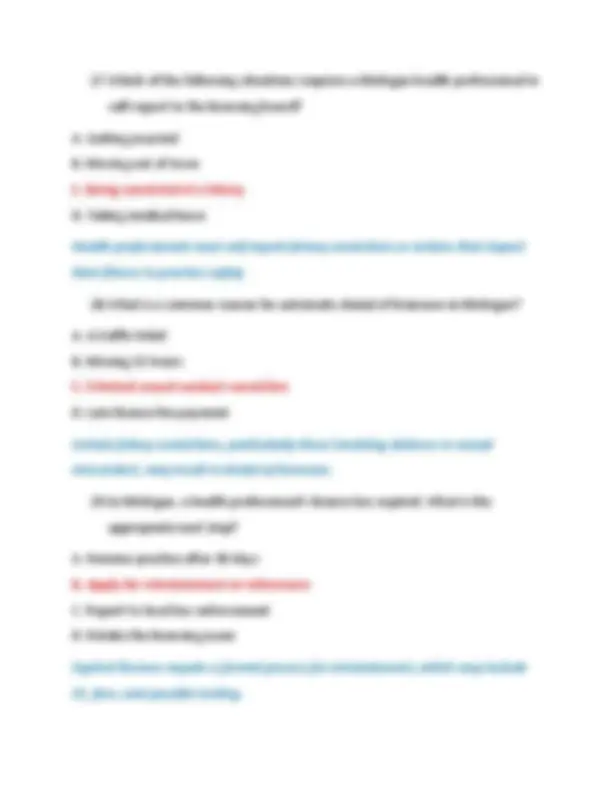
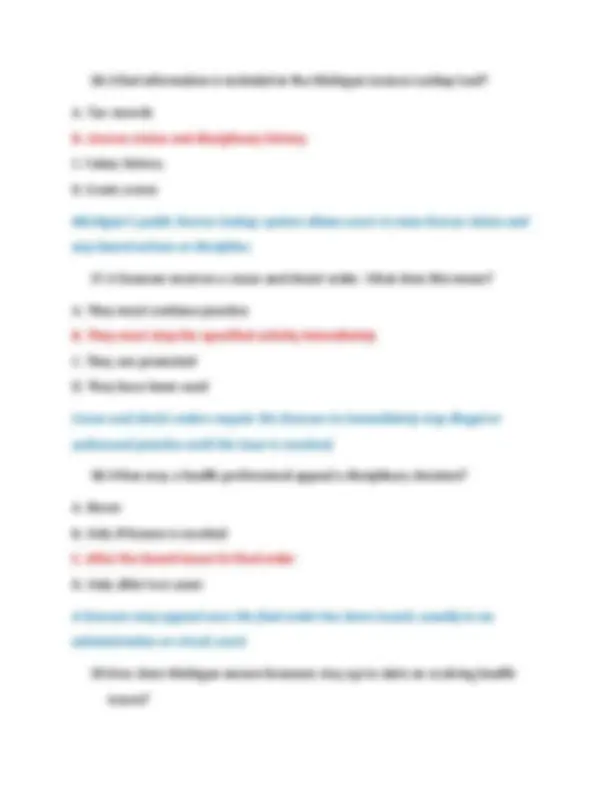
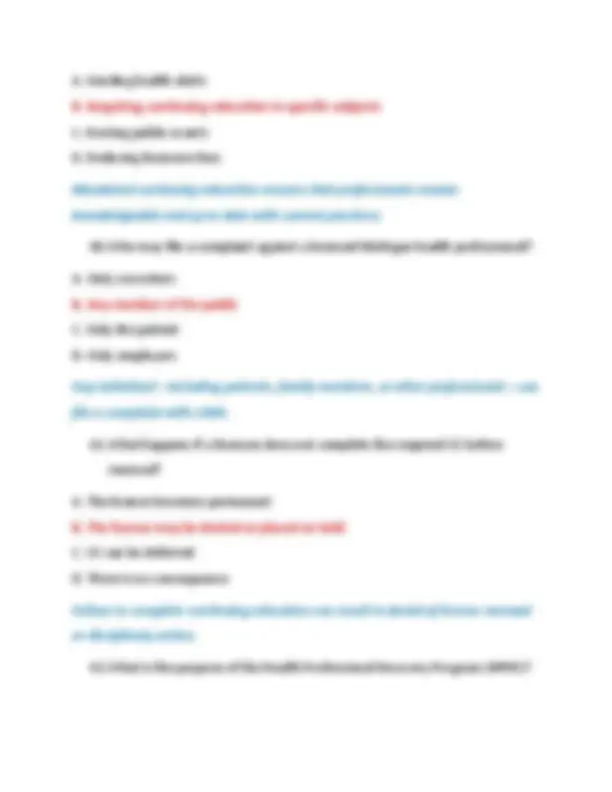
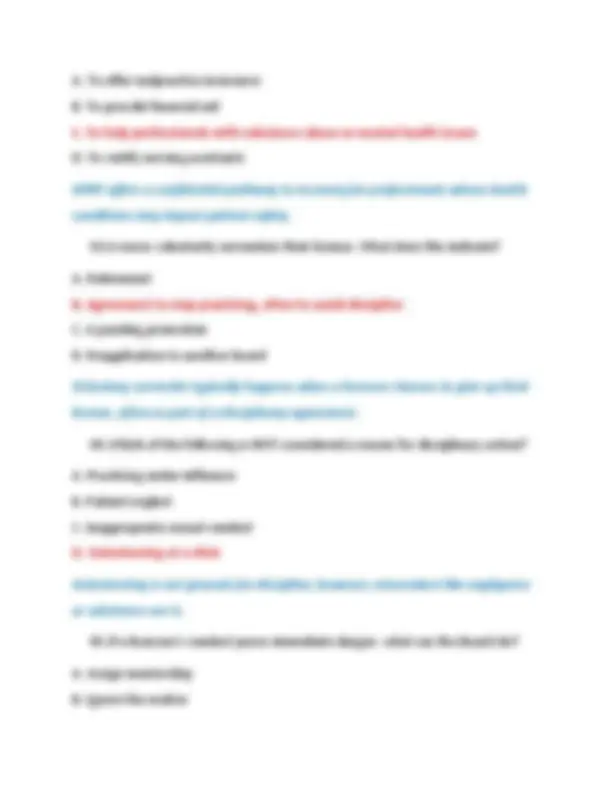
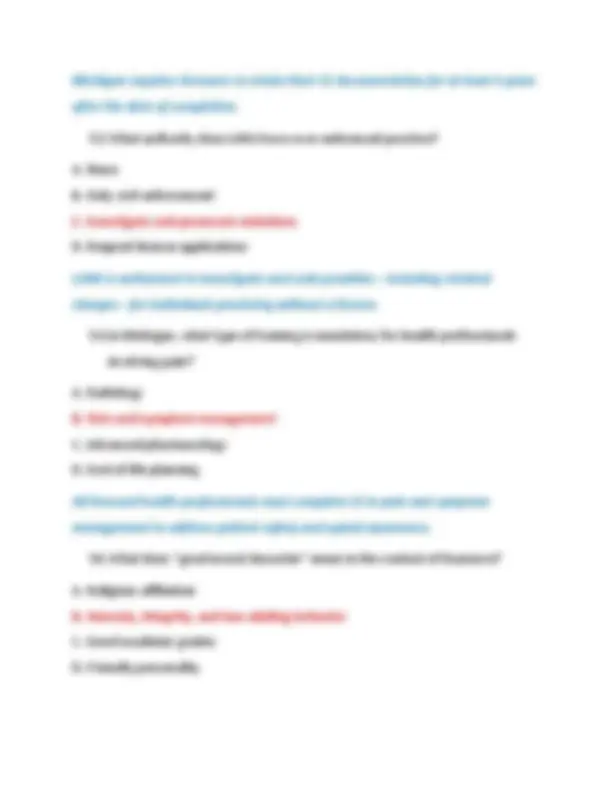
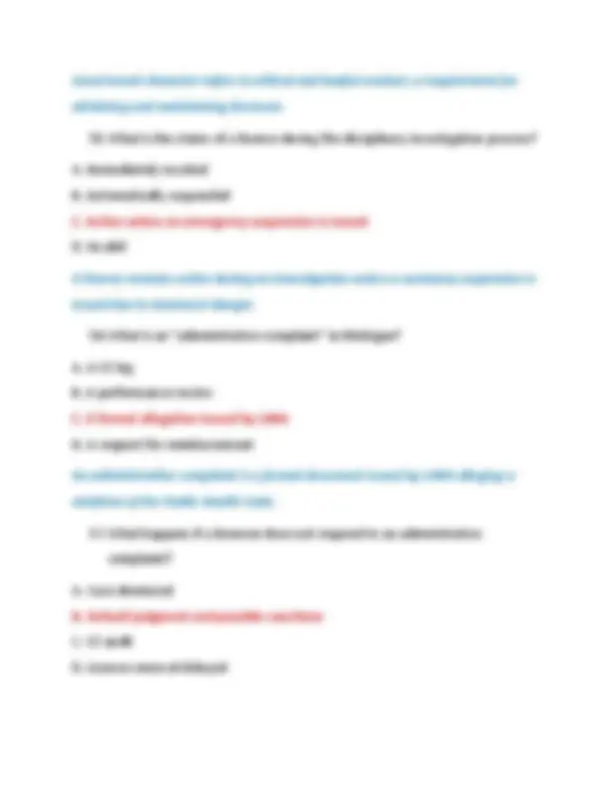
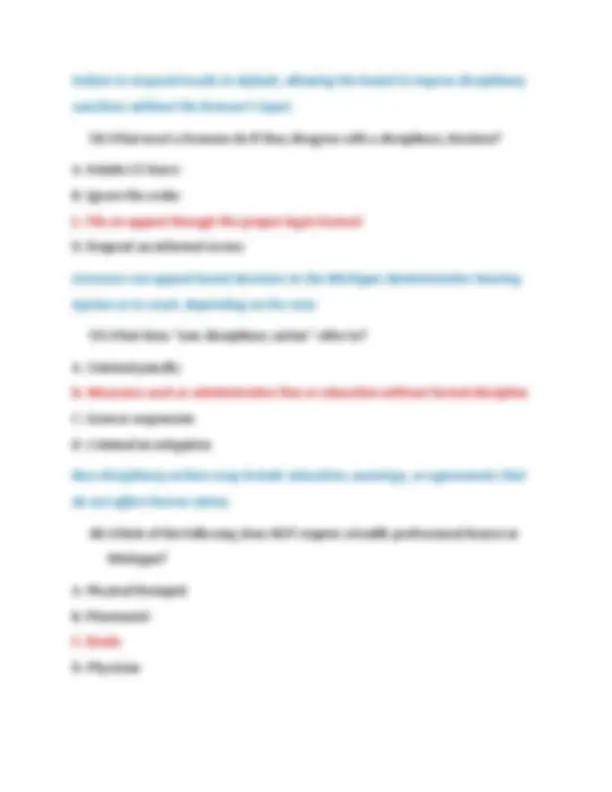
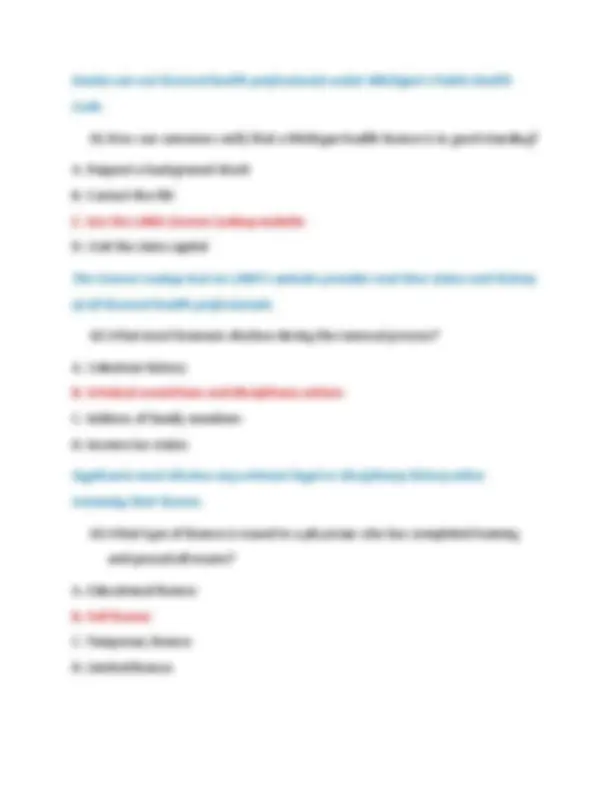
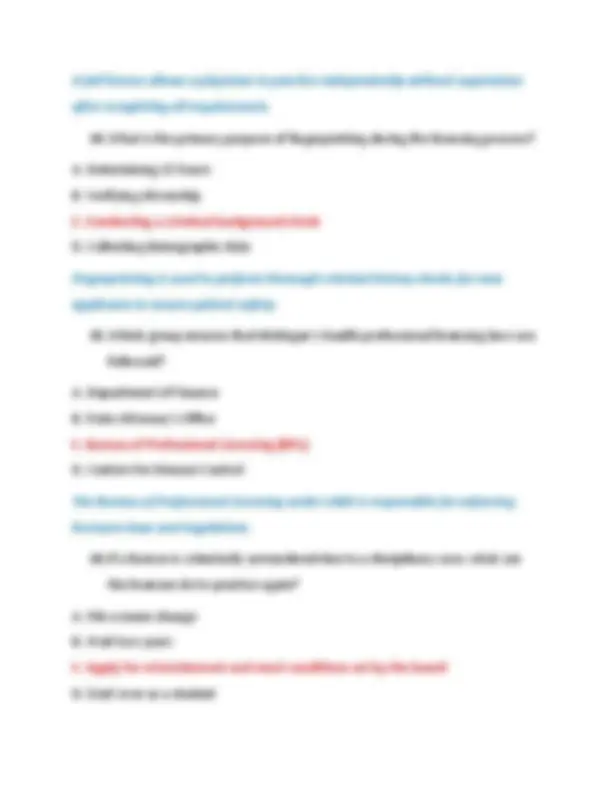
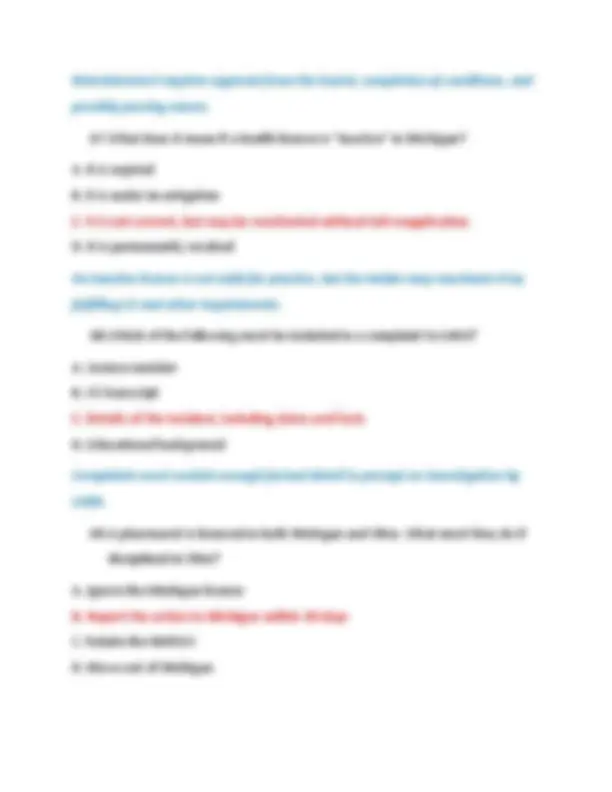
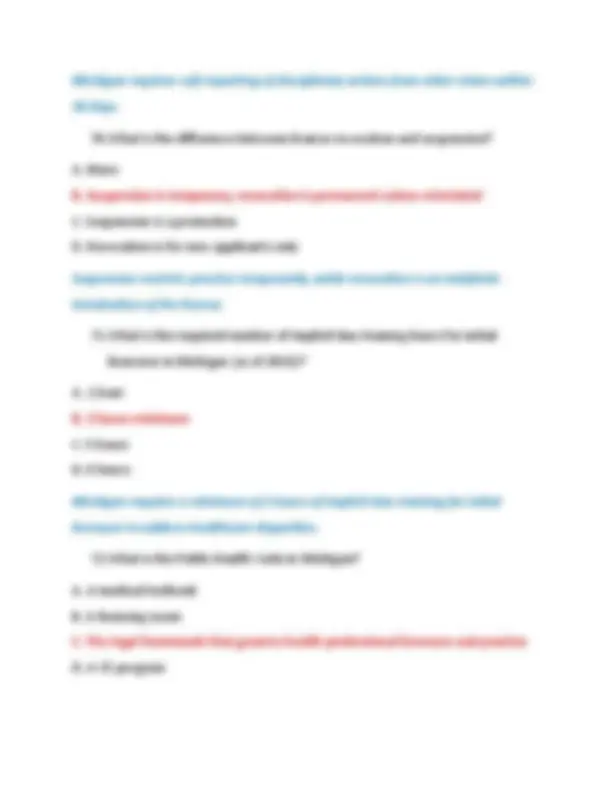
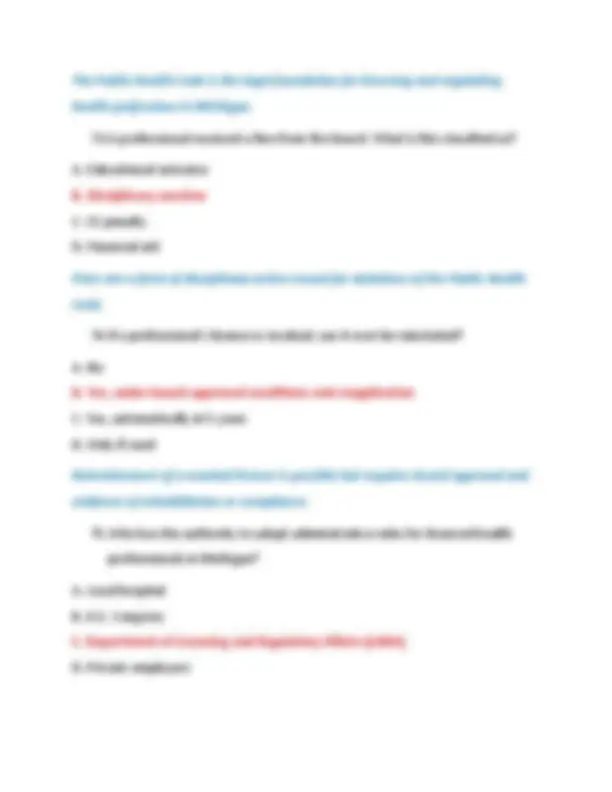
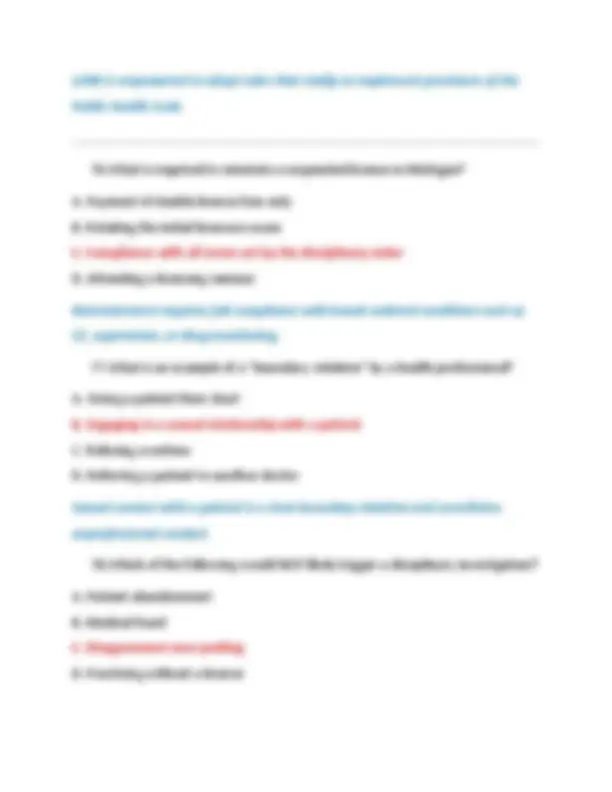
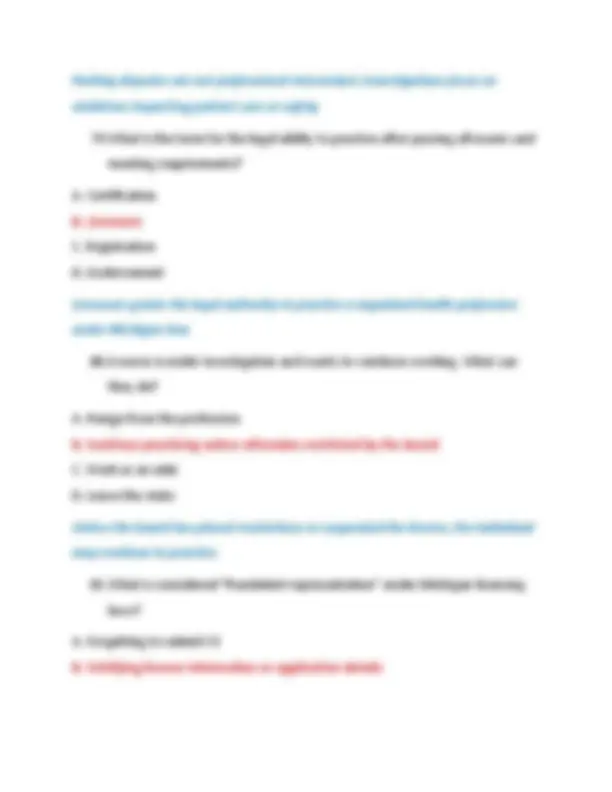
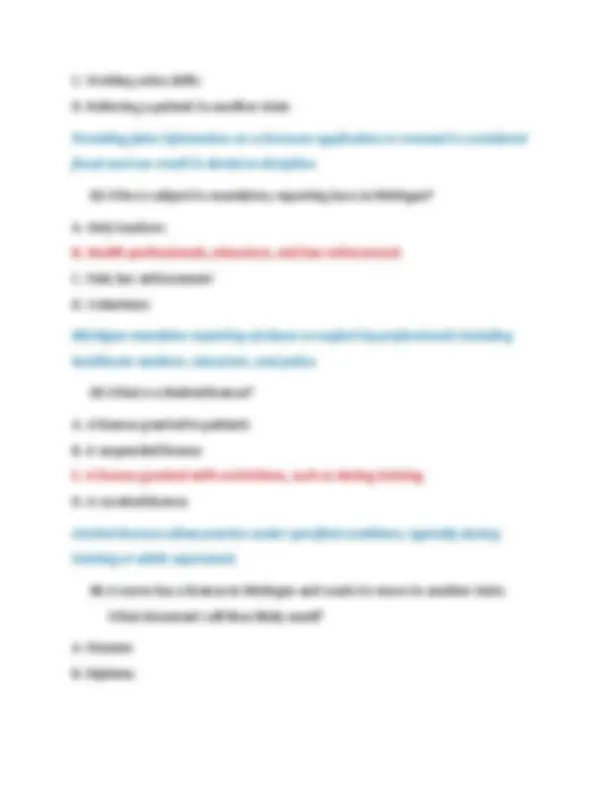
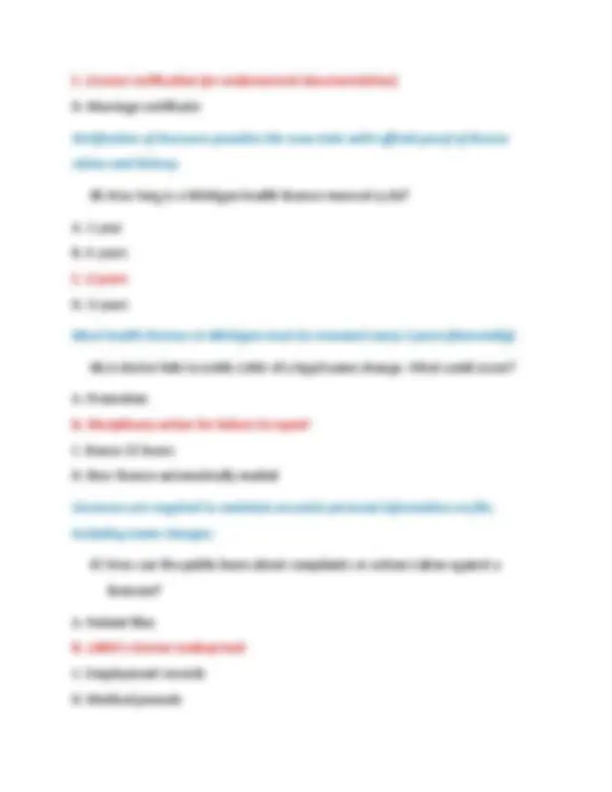
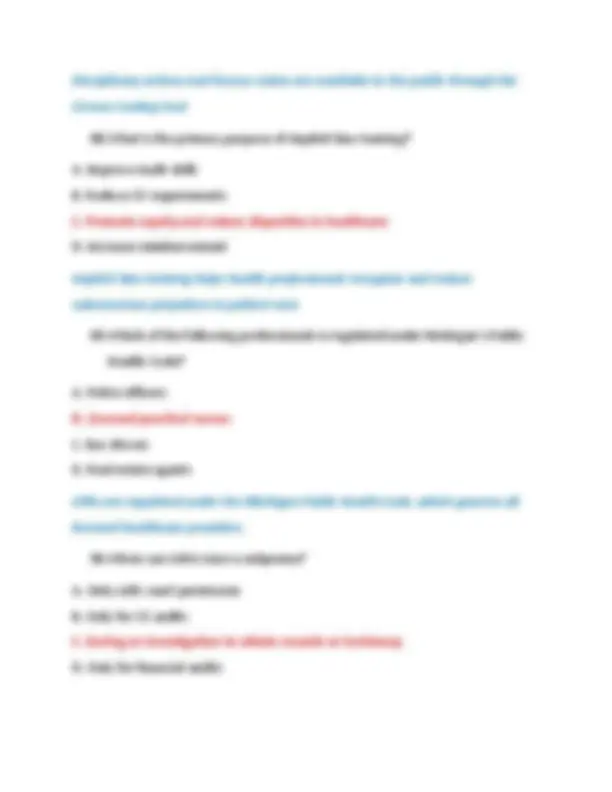
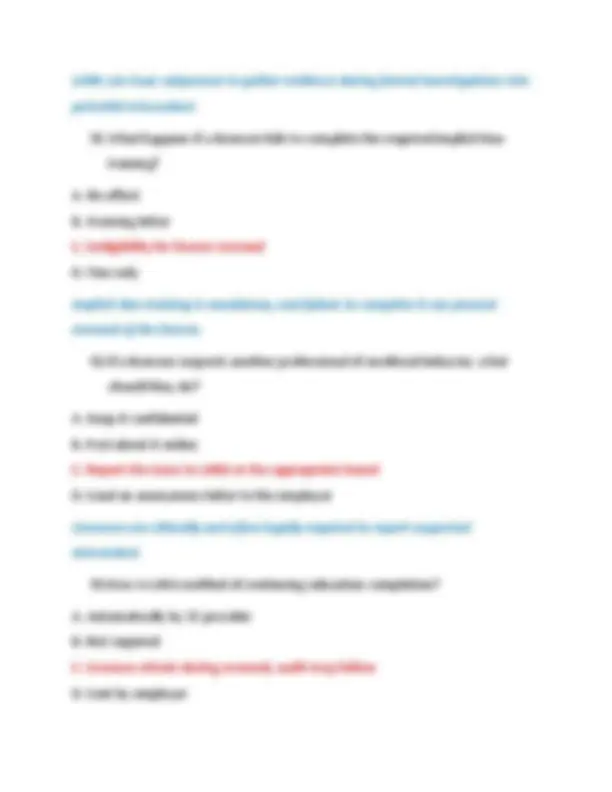
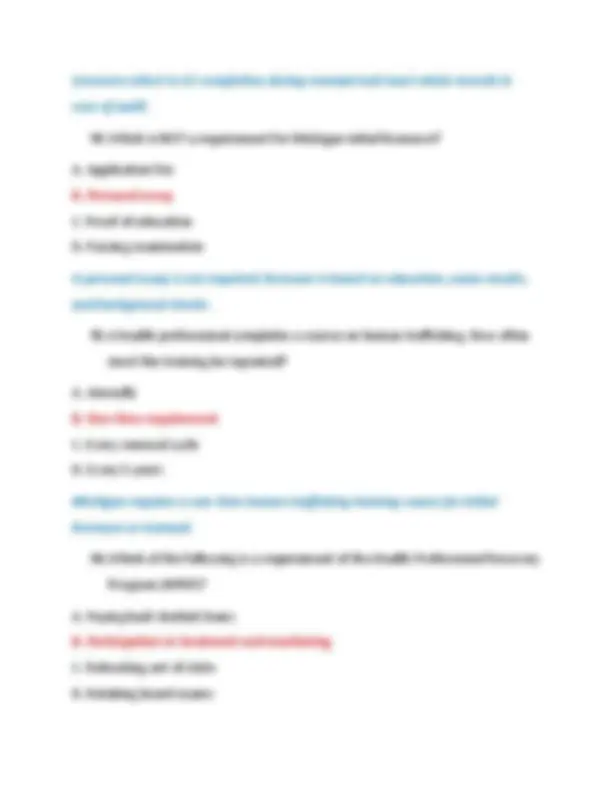
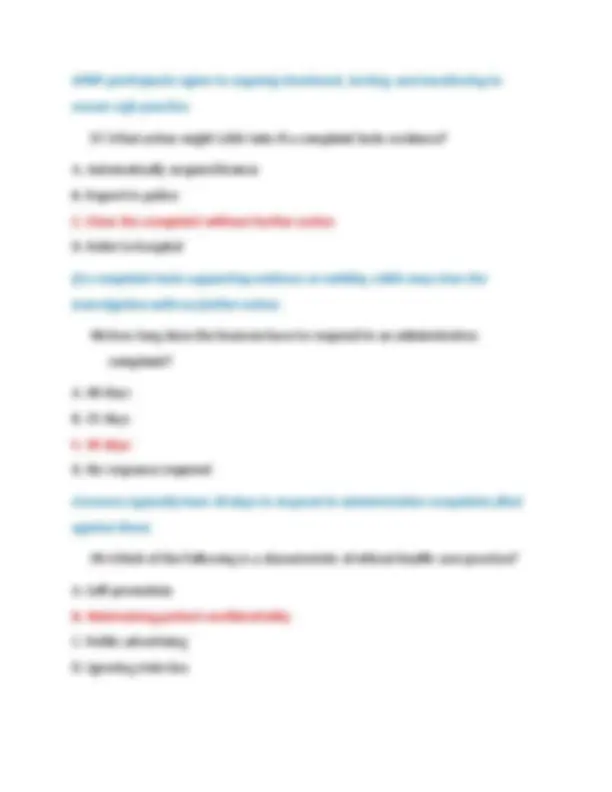
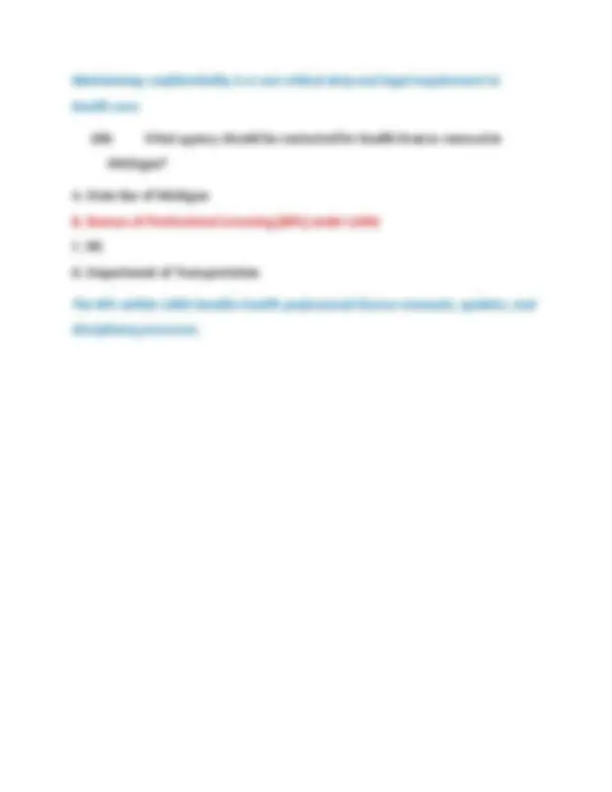


Study with the several resources on Docsity

Earn points by helping other students or get them with a premium plan


Prepare for your exams
Study with the several resources on Docsity

Earn points to download
Earn points by helping other students or get them with a premium plan
Community
Ask the community for help and clear up your study doubts
Discover the best universities in your country according to Docsity users
Free resources
Download our free guides on studying techniques, anxiety management strategies, and thesis advice from Docsity tutors
Michigan – MI Department of Licensing & Regulatory Affairs, Health Professional Licensing exam Questions And Correct Answers (Verified Answers) Plus Rationales 2025 Q&A | Instant Download
Typology: Exams
1 / 34

This page cannot be seen from the preview
Don't miss anything!



























A. Submit a handwritten request only B. Reapply as a new applicant C. Complete required continuing education and pay reinstatement fees D. Complete a background check only To reactivate a lapsed license, the professional must meet CE requirements and pay the necessary fees to ensure continued competence.
12.In Michigan, which of the following is NOT a requirement for licensure as a physician? A. Completion of medical school B. High school diploma C. Passing USMLE or COMLEX D. Completion of postgraduate training A high school diploma alone is not sufficient; the licensing process involves extensive post-secondary and graduate education. 13.Which type of license is issued to health professionals in training? A. Independent license B. Limited or educational license C. Probationary license D. Restricted license Limited licenses are often used during residency or supervised practice while training is still ongoing. 14.What is a consequence of practicing without a valid license in Michigan? A. Community service B. Written warning C. Criminal charges and fines D. Temporary privileges Practicing without a license is a serious offense and may result in misdemeanor or felony charges along with financial penalties.
18.A license is “on probation.” What does this mean? A. It has expired B. It is unrestricted C. It is subject to conditions or supervision D. It is revoked Probationary licenses allow continued practice but under terms set by the licensing board, such as oversight or further education. 19.What must a health professional do to change their name on their license? A. Send a phone message B. Email the board C. Submit legal documentation of name change D. Wait until license renewal Legal documentation such as a marriage certificate or court order must be provided to formally change a name on a license. 20.Which of the following is considered unprofessional conduct? A. Taking vacation B. Forgetting CPR recertification C. Falsifying patient records D. Participating in a study Falsification of records is a serious breach of ethics and can result in disciplinary action, including license revocation. 21.What agency conducts background checks on Michigan health professional applicants?
B. Michigan State Police/FBI C. Local school board D. Insurance company Criminal background checks are typically conducted by the Michigan State Police and/or FBI to ensure public safety. 22.How many hours of implicit bias training must Michigan licensees complete for renewal? A. 1 hour B. 1 hour annually C. 5 hours once D. None Michigan requires health professionals to complete 1 hour of implicit bias training each year for license renewal. 23.A disciplinary action in another state can affect Michigan licensure. How? A. It has no effect B. Michigan may also take disciplinary action C. Michigan license is automatically canceled D. The provider must reapply Disciplinary action in another state can be grounds for Michigan to impose similar sanctions after review. 24.Which of the following is required for a license renewal in Michigan?
27.Which of the following situations requires a Michigan health professional to self-report to the licensing board? A. Getting married B. Moving out of town C. Being convicted of a felony D. Taking medical leave Health professionals must self-report felony convictions or actions that impact their fitness to practice safely. 28.What is a common reason for automatic denial of licensure in Michigan? A. A traffic ticket B. Missing CE hours C. Criminal sexual conduct conviction D. Late license fee payment Certain felony convictions, particularly those involving violence or sexual misconduct, may result in denial of licensure. 29.In Michigan, a health professional's license has expired. What is the appropriate next step? A. Resume practice after 30 days B. Apply for reinstatement or relicensure C. Report to local law enforcement D. Retake the licensing exam Expired licenses require a formal process for reinstatement, which may include CE, fees, and possible testing.
30.Which of the following types of misconduct must be reported to LARA within 30 days? A. Loss of malpractice insurance B. Conviction of a misdemeanor related to the practice of the profession C. Incomplete CE hours D. Patient no-show rate Misdemeanor convictions that relate to professional conduct must be reported promptly to LARA. 31.A nurse was found diverting medications. What type of sanction could be imposed? A. Change in shift B. None if the nurse apologizes C. License suspension or revocation D. CE audit Drug diversion is a serious offense and may lead to license suspension or permanent revocation. 32.A health professional agrees to a consent order. What does this mean? A. The license is renewed early B. The complaint is dismissed C. The professional agrees to disciplinary terms without a hearing D. The professional sues the board Consent orders are legal agreements between the licensee and the board to resolve disciplinary cases without a contested hearing.
36.What information is included in the Michigan License Lookup tool? A. Tax records B. License status and disciplinary history C. Salary history D. Exam scores Michigan’s public license lookup system allows users to view license status and any board actions or discipline. 37.A licensee receives a cease-and-desist order. What does this mean? A. They must continue practice B. They must stop the specified activity immediately C. They are promoted D. They have been sued Cease-and-desist orders require the licensee to immediately stop illegal or unlicensed practice until the issue is resolved. 38.When may a health professional appeal a disciplinary decision? A. Never B. Only if license is revoked C. After the board issues its final order D. Only after two years A licensee may appeal once the final order has been issued, usually to an administrative or circuit court. 39.How does Michigan ensure licensees stay up-to-date on evolving health issues?
A. Sending health alerts B. Requiring continuing education in specific subjects C. Hosting public events D. Reducing licensure fees Mandated continuing education ensures that professionals remain knowledgeable and up to date with current practices. 40.Who may file a complaint against a licensed Michigan health professional? A. Only coworkers B. Any member of the public C. Only the patient D. Only employers Any individual—including patients, family members, or other professionals—can file a complaint with LARA. 41.What happens if a licensee does not complete the required CE before renewal? A. The license becomes permanent B. The license may be denied or placed on hold C. CE can be deferred D. There is no consequence Failure to complete continuing education can result in denial of license renewal or disciplinary action. 42.What is the purpose of the Health Professional Recovery Program (HPRP)?
C. Issue a summary suspension D. Postpone the decision Summary suspension is an emergency action that immediately halts practice to protect public safety. 46.How are disciplinary actions made public in Michigan? A. Only mailed to the licensee B. Kept private C. Posted on LARA’s website and license lookup D. Sent to employers only Disciplinary actions are publicly available online through LARA’s License Lookup for transparency and accountability. 47.A licensee fails to respond to a board inquiry. What can result? A. Automatic promotion B. Delayed renewal only C. Additional disciplinary action D. Free license extension Failure to respond to an official inquiry can be treated as noncompliance and lead to more serious consequences. 48.What must be included in every CE certificate for Michigan licensees? A. Home address B. Social security number C. Provider name, activity title, and number of hours D. Birth date
CE certificates must clearly list the provider, course details, date, and hours earned to ensure compliance. 49.What is the main goal of professional licensing? A. Generating state revenue B. Protecting the public C. Promoting universities D. Managing insurance companies The primary purpose of licensure is to protect the public by ensuring qualified and ethical professionals. 50.What is a stipulation agreement? A. A contract for employment B. An insurance declaration C. A legal agreement between the licensee and board to resolve a case D. A CE certificate A stipulation agreement is used to resolve disciplinary cases without a hearing, often including terms like probation or retraining. 51.What is the required retention period for continuing education records in Michigan? A. 1 year B. 2 years C. 4 years D. 10 years
Good moral character refers to ethical and lawful conduct, a requirement for obtaining and maintaining licensure. 55.What is the status of a license during the disciplinary investigation process? A. Immediately revoked B. Automatically suspended C. Active unless an emergency suspension is issued D. Invalid A license remains active during an investigation unless a summary suspension is issued due to imminent danger. 56.What is an “administrative complaint” in Michigan? A. A CE log B. A performance review C. A formal allegation issued by LARA D. A request for reimbursement An administrative complaint is a formal document issued by LARA alleging a violation of the Public Health Code. 57.What happens if a licensee does not respond to an administrative complaint? A. Case dismissed B. Default judgment and possible sanctions C. CE audit D. License renewal delayed
Failure to respond results in default, allowing the board to impose disciplinary sanctions without the licensee's input. 58.What must a licensee do if they disagree with a disciplinary decision? A. Retake CE hours B. Ignore the order C. File an appeal through the proper legal channel D. Request an informal review Licensees can appeal board decisions to the Michigan Administrative Hearing System or to court, depending on the case. 59.What does “non-disciplinary action” refer to? A. Criminal penalty B. Measures such as administrative fine or education without formal discipline C. License suspension D. Criminal investigation Non-disciplinary actions may include education, warnings, or agreements that do not affect license status. 60.Which of the following does NOT require a health professional license in Michigan? A. Physical therapist B. Pharmacist C. Doula D. Physician